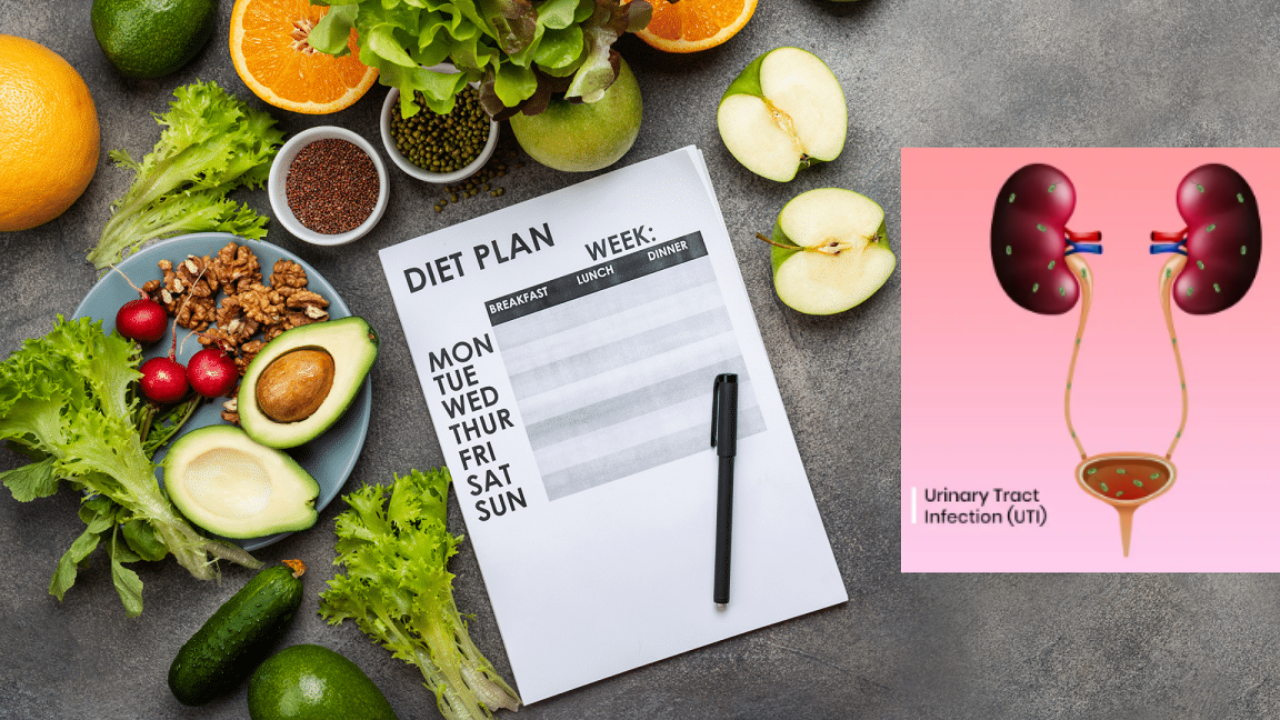Diet Plan For Urinary Tract Infection

A UTI (urinary tract infection) is a bacterial infection that affects the urinary system. To manage and prevent UTIs, it’s essential to maintain a healthy diet that supports a healthy urinary system. Here’s a sample diet plan that can help manage UTI:
Drink Plenty of Water: Staying hydrated is essential to flush out bacteria from the urinary system. Aim for at least 8-10 cups of water per day.
Probiotics: Probiotics are beneficial bacteria that help to promote a healthy balance of bacteria in the body. Include foods like yogurt, kefir, kimchi, sauerkraut, and miso in your diet.
Cranberries: Cranberries have been shown to help prevent UTIs by preventing bacteria from adhering to the urinary tract walls. You can consume cranberries in the form of juice or fresh fruits.
Vitamin C: Foods rich in Vitamin C, such as citrus fruits, bell peppers, kiwi, and strawberries, can help prevent UTIs by making the urine more acidic, which inhibits the growth of bacteria.
Avoid processed and spicy foods: Processed and spicy foods can irritate the urinary tract, making it more susceptible to UTIs.
Here’s a sample diet plan for UTI:
Breakfast: Oatmeal with fresh fruits and almond milk or low-fat yogurt with berries and chia seeds.
Mid-morning snack: An apple or pear with a small handful of almonds.
Lunch: Grilled chicken or fish with a green salad, topped with a light vinaigrette dressing.
Afternoon snack: Carrots and hummus or a small serving of plain Greek yogurt with honey and berries.
Dinner: Quinoa with roasted vegetables or grilled salmon with steamed broccoli and brown rice.
Evening snack: A small serving of fresh fruit or a glass of cranberry juice.
Remember to consult with your healthcare provider to get personalized recommendations for your diet while managing UTI. Additionally, make sure to complete any prescribed antibiotics and follow good hygiene practices to prevent future infections.
Diet Plan For Urinary Track Infection (1400-1500 CAL)
Disclaimer
This is a basic plan for your knowledge and information
Tops Foods For UTI ( Urinary Tract infection)
Orange
Dark Chocolate
Tomato
Oats
Curd
Broccoli
Spinach
Early Morning
1 cinnamon water
4 soaked almonds
2 walnuts
Breakfast
1 pc paneer stffed oats cheela
Coconut water
Mid-morning
Mixed Fruit bowl
Lunch
Salad
Rajma (60 gms raw) plus rice (40 gms raw)
Buttermilk
Evening
Sprouts salad
2 pcs dark chocolate
Dinner
Spinach soup
Any vegetables plus any dal (40 gms raw) plus 1 roti
UTI (urinary tract infection) is an infection in any part of the urinary system.
Types of UTI
There are several types of urinary tract infections (UTIs), which are classified based on the part of the urinary tract that is infected. Some common types of UTIs include:
Cystitis: This is a type of UTI that affects the bladder. It is the most common type of UTI and is often characterized by symptoms such as painful urination, frequent urination, and a strong urge to urinate.
Pyelonephritis: This is a type of UTI that affects the kidneys. It is a more serious type of infection and can cause symptoms such as fever, chills, and pain in the back or side.
Urethritis: This is a type of UTI that affects the urethra, which is the tube that carries urine out of the body. It can cause symptoms such as painful urination and discharge from the urethra.
Prostatitis: This is a type of UTI that affects the prostate gland in men. It can cause symptoms such as pain in the groin, difficulty urinating, and frequent urination.
The type of UTI a person has can be determined by a healthcare provider through a physical examination and laboratory tests, such as a urine culture. Treatment for a UTI will depend on the type and severity of the infection.
Causes and signs of UTI
A UTI, or urinary tract infection, is a common bacterial infection that can affect different parts of the urinary tract, including the urethra, bladder, and kidneys. Here are some common causes and signs of a UTI:
Causes:
Bacteria enter the urinary tract through the urethra, which can occur during sexual activity, poor hygiene, or other factors that allow bacteria to enter the urethra
A suppressed immune system can make it easier for bacteria to cause an infection
Certain medical conditions that affect the urinary tract, such as kidney stones or an enlarged prostate
Signs:
Pain or a burning sensation during urination
Frequent or urgent need to urinate, even if only small amounts are produced
Cloudy or strong-smelling urine
Lower abdominal or pelvic pain or discomfort
Fever, chills, and other signs of more severe infection if the infection has spread to the kidneys
It’s important to seek medical attention if you suspect you have a UTI, as untreated UTIs can lead to more serious health complications. Your healthcare provider may prescribe antibiotics or other treatments to clear the infection and prevent it from spreading. Drinking plenty of water and practicing good hygiene can also help prevent UTIs.



